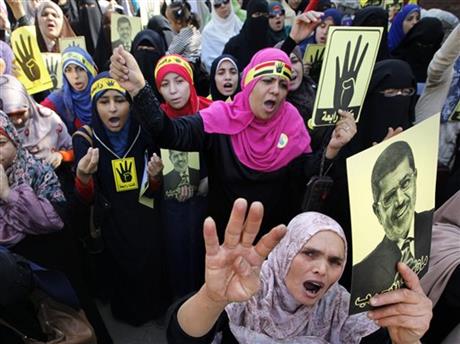 By TONY G. GABRIEL and MARIAM RIZK
By TONY G. GABRIEL and MARIAM RIZK
Supporters of Egypt’s ousted President Mohammed Morsi raise his posters and their hands with four raised fingers, which has become a symbol of the Rabaah al-Adawiya mosque, where Morsi supporters had held a sit-in for weeks that was violently dispersed in August, during a protest in Cairo, Egypt, Friday, Nov. 22, 2013. (AP Photo/Amr Nabil)
Mideast Egypt
Supporters of Egypt’s ousted President Mohammed Morsi raise his posters and their hands with four raised fingers, which has become a symbol of the Rabaah al-Adawiya mosque, where Morsi supporters had held a sit-in for weeks that was violently dispersed in August, during a protest in Cairo, Egypt, Friday, Nov. 22, 2013. (AP Photo/Amr Nabil)
Mideast Egypt
An Egyptian soldier takes position over a military armored vehicle in front of Omar Makram Mosque, near Tahrir Square in Cairo, Egypt, Thursday, Nov. 21, 2013. A suicide car bomb hit a bus convoy of off-duty Egyptian army soldiers in the Sinai Peninsula on Wednesday, Nov. 20, 2013 killing nearly a dozen and wounding dozens more, in the latest of a stepped-up wave of attacks blamed on Islamic militants sympathetic to ousted President Mohammed Morsi. (AP Photo/Amr Nabil)
Mideast Egypt
An Egyptian young woman mourns during the funeral of 23-year-old Mahmoud Abdel-Hakim, known as Moody, who was shot dead by live gunshots after clashes erupted during Tuesday’s protests marking the second anniversary of some of the fiercest confrontations between Egyptian protesters and security forces in Mohammed Mahmoud street near Tahrir Square, in Cairo Egypt, Thursday, Nov. 21, 2013. (AP Photo/Amr Nabil)
Mideast Egypt
Egyptian men carry the coffin of 23-year-old Mahmoud Abdel-Hakim, known as Moody, who was shot dead by live gunshots after clashes erupted during Tuesday’s protests marking the second anniversary of some of the fiercest confrontations between Egyptian protesters and security forces in Mohammed Mahmoud street near Tahrir Square, during his funeral procession, in Cairo Egypt, Thursday, Nov. 21, 2013. (AP Photo/Amr Nabil)
Prev 1 of 5 Next
CAIRO (AP) — Egypt’s Muslim Brotherhood lashed out Friday at U.S. Secretary of State John Kerry for saying the Islamist group “stole” the 2011 popular uprising that toppled autocrat Hosni Mubarak, saying he was twisting facts.
Thousands of Brotherhood supporters took the streets around the country in protests to mark the passage of 100 days since security forces launched a violent crackdown on the group, killing hundreds when they broke up two sit-in camps by backers of ousted President Mohammed Morsi.
Islamists have been holding small, localized protests almost daily to denounce the military’s July 3 removal of Morsi, the country’s first freely elected president. At times, the rallies have swelled to somewhat larger numbers, but the group’s ability to bring out supporters has been crippled by a wave of arrests that has jailed thousands of members.
The military ousted Morsi after massive protests by millions nationwide who demanded his removal after a year in office, accusing him and the Brotherhood of trying to monopolize power. Morsi supporters have accused the military of wrecking the country’s nascent democracy with the coup.
Kerry’s comments about the Brotherhood on Wednesday appeared to be an attempt by Washington to ease tensions with Egypt’s new military-backed government. After initial U.S. criticism of the coup, many Egyptians have accused the U.S. of siding with the Brotherhood and Morsi.
Kerry said the activists who led 18-day uprising that brought down Mubarak had not been “motivated by religion or ideology.” He said hopes for greater freedom and opportunity and an end to corruption was “what drove that revolution. And then it got stolen by the one single-most organized entity in the state, which was the Brotherhood.”
In a statement Friday, the Brotherhood said Kerry was “twisting realities and ignoring facts.” It said the Brotherhood “rose to parliament and the presidency through elections” and accused the U.S. of “supporting the military coup … and ignoring the massacres and oppressive measures that the coup government is carrying out in Egypt.”
At least 600 people were killed on Aug. 14 when riot police cleared the two pro-Morsi camps in Cairo’s Rabaah el-Adawiya and Nahda squares.
Protesters on Friday raised Morsi’s portraits and held up yellow posters with the symbol of a hand raising four fingers. The word “rabaah” means fourth in Arabic, and the gesture has become a symbol of support for Morsi.
With barbed wires and armored vehicles, army and police forces sealed off Friday the two squares, fearing attempts by Islamist protesters to storm them, Egypt’s state news agency MENA reported. The main coalition of Morsi supporters said it will attempt to gather Sunday at the two squares, according to the website of the Freedom and Justice Party newspaper, a Brotherhood mouthpiece.



